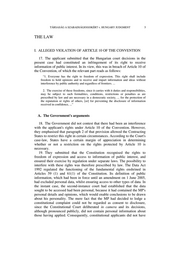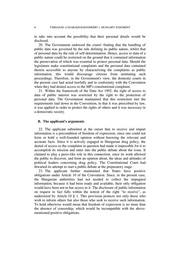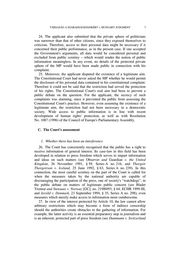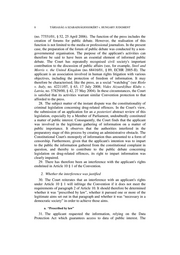
Informationsfreiheit gebündelt, verschlagwortet und digitalisiert.
Die Entscheidungsdatenbank setzt Rechtssprechung in den Fokus und ermöglicht fundierte Recherchen zu aktuellen und vergangenen Urteilen und Entscheidungen rundum Informationsfreiheit.

Aktives Presserecht – Argumente für Auskünfte
Oft verweigern Behörden Auskünfte auf Anfragen von Journalist*innen. Sie berufen sich dabei in der Regel auf angebliche Ausnahmen nach den jeweils gültigen Landespressegesetzen. Häufig ist Unwissen der Grund für die Auskunftsverweigerung und nicht böser Wille. Als Teil des Projektes „Fragen und Antworten - Auskunftsrechte kennen und nutzen“, einer Kooperation mit Netzwerk Recherche, stärkt die Entscheidungsdatenbank das Wissen rundum Auskunftsrechte und hilft besser argumentieren zu können. Journalist*innen können für ihre Recherchen wichtige Urteile, Bescheide und Beschlüsse kostenlos im Volltext eingesehen und durchsuchen.
Information
- Aktenzeichen
- 37374/05
- Datum
- 14. April 2009
- Gericht
- Europäischer Gerichtshof für Menschenrechte
- Gesetz
- Europäische Menschenrechtskonvention
Urteil: Europäischer Gerichtshof für Menschenrechte am 14. April 2009
37374/05
In dem Fall "Társaság a Szabadságjogokért vs. Ungarn" stellt der Europäische Gerichtshof für Menschenrechte fest, dass die Verweigerung der von einem Bürgerrechtsverband beantragten Herausgabe der Beschwerde eines ungarischen Parlamentariers beim dortigen Verfassungsgericht über die Rechtmäßigkeit einer neuen Drogengesetzgebung einen Verstoß gegen die Europäische Menschenrechtskonvention darstellt. Artikel 10 der Konvention (Freiheit der Meinungsäußerung) kann auch einen Informationsanspruch gegenüber öffentlichen Stellen umfassen, wenn diese bereits über Informationen verfügen, welche für eine öffentliche Debatte von Bedeutung sind. Die Entscheidung liegt ausschließlich in englischer und französischer Sprache vor. (Quelle: LDA Brandenburg)
CONSEIL COUNCIL DE L’EUROPE OF EUROPE COUR EUROPÉENNE DES DROITS DE L’HOMME EUROPEAN COURT OF HUMAN RIGHTS SECOND SECTION CASE OF TÁRSASÁG A SZABADSÁGJOGOKÉRT v. HUNGARY (Application no. 37374/05) JUDGMENT STRASBOURG 14 April 2009 This judgment will become final in the circumstances set out in Article 44 § 2 of the Convention. It may be subject to editorial revision.


TÁRSASÁG A SZABADSÁGJOGOKÉRT v. HUNGARY JUDGMENT 1 In the case of Társaság a Szabadságjogokért v. Hungary, The European Court of Human Rights (Second Section), sitting as a Chamber composed of: Françoise Tulkens, President, Ireneu Cabral Barreto, Vladimiro Zagrebelsky, Danut÷ Jočien÷, Dragoljub Popović, András Sajó, Nona Tsotsoria, judges, and Sally Dollé, Section Registrar, Having deliberated in private on 13 November 2008 and 24 March 2009, Delivers the following judgment, which was adopted on the last- mentioned date: PROCEDURE 1. The case originated in an application (no. 37374/05) against the Republic of Hungary lodged with the Court under Article 34 of the Convention for the Protection of Human Rights and Fundamental Freedoms (“the Convention”) by an association registered in Hungary, the Hungarian Civil Liberties Union (Társaság a Szabadságjogokért) (“the applicant”), on 11 October 2005. 2. The applicant was represented by Mr L. Baltay, a lawyer practising in Gyál. The Hungarian Government (“the Government”) were represented by Mr L. Höltzl, Agent, Ministry of Justice and Law Enforcement. 3. The applicant alleged that the decisions of the Hungarian courts denying it access to the details of a parliamentarian's complaint pending before the Constitutional Court had amounted to a breach of its right to have access to information of public interest. 4. By a decision of 13 November 2008 the Court declared the application admissible. 5. The applicant and the Government each filed observations on the merits (Rule 59 § 1).

2 TÁRSASÁG A SZABADSÁGJOGOKÉRT v. HUNGARY JUDGMENT THE FACTS I. THE CIRCUMSTANCES OF THE CASE 6. The applicant is an association founded in 1994, with its seat in Budapest. 7. In March 2004 a Member of Parliament (“the MP”) and other individuals lodged a complaint for abstract review with the Constitutional Court. The complaint requested the constitutional scrutiny of some recent amendments to the Criminal Code which concerned certain drug-related offences. 8. In July 2004 the MP gave a press interview concerning the complaint. 9. On 14 September 2004 the applicant – a non-governmental organisation whose declared aim is to promote fundamental rights as well as to strengthen civil society and the rule of law in Hungary and which is active in the field of drug policy – requested the Constitutional Court to grant them access to the complaint pending before it, in accordance with section 19 of Act no. 63 of 1992 on the Protection of Personal Data and the Public Nature of Data of Public Interest (“the Data Act 1992”). 10. On 12 October 2004 the Constitutional Court denied the request without having consulted the MP, explaining that a complaint pending before it could not be made available to outsiders without the approval of its author. 11. On 10 November 2004 the applicant brought an action against the Constitutional Court. It requested the Budapest Regional Court to oblige the respondent to give it access to the complaint, in accordance with section 21(7) of the Data Act 1992. 12. On 13 December 2004 the Constitutional Court adopted a decision on the constitutionality of the impugned amendments to the Criminal Code. It contained a summary of the complaint in question and was pronounced publicly. 13. Notwithstanding the fact that the Constitutional Court procedure had already been terminated, on 24 January 2005 the Regional Court dismissed the applicant's action. It held in essence that the complaint could not be regarded as “data” and the lack of access to it could not be disputed under the Data Act 1992. 14. The applicant appealed, disputing the Regional Court's findings. Moreover, it requested that the complaint be made available to it after the deletion of any personal information contained therein. 15. On 5 May 2005 the Court of Appeal upheld the first-instance decision. It considered that the complaint contained some “data”; however, that data was “personal” and could not be accessed without the author's

TÁRSASÁG A SZABADSÁGJOGOKÉRT v. HUNGARY JUDGMENT 3 approval. Such protection of personal data could not be overridden by other lawful interests, including the accessibility of public information. 16. The applicant's secondary claim was rejected without any particular reasoning. II. RELEVANT DOMESTIC LAW 1. The Constitution of the Republic of Hungary Article 59 “(1) ... [E]veryone has the right to a good reputation, the privacy of his home and the protection of secrecy in private affairs and personal data.” Article 61 “(1) ... [E]veryone has the right to express freely his/her opinion and, furthermore, to access and distribute information of public interest.” 2. Act no. 32 of 1989 on the Constitutional Court Section 1 “The competence of the Constitutional Court includes: (b) posterior review of the constitutionality of statutes...” Section 21 “(2) The procedure under section 1 (b) may be initiated by anyone.” 3. The Data Act 1992 Section 2 (as in force at the material time) “(4) Public information: data, other than personal data, which relates to the activities of, or is processed by, a body or a person carrying out State or municipal tasks or other public duties defined by the law.” Section 3 “(1) (a) Personal data may be processed if the person concerned consents to it....”

4 TÁRSASÁG A SZABADSÁGJOGOKÉRT v. HUNGARY JUDGMENT Section 4 “Unless exception is made under the law, the right to protection of personal data and the personality rights of the person concerned must not be violated by ... interests related to data management, including the public nature (section 19) of data of general interest.” Section 19 “(1) The organs or persons charged with exercising State ... functions shall, within the scope of their competence ..., promote and secure the right of the public to be informed accurately and speedily. (2) The organs mentioned in subsection 1 hereof shall regularly publish or otherwise make accessible the most important data ... concerning their activities. ... (3) Those mentioned in subsection 1 hereof shall ensure that anyone is able to access any data of public interest which they may handle, unless the data has been lawfully declared State or service secrets by a competent authority ... or the law restricts the right of public access to data of public interest, specifying the types of data concerned, regard being had to: (a) the interests of national defence; (b) the interests of national security; (c) the interests of the prevention or prosecution of crime; (d) the interests of central finances or foreign exchange policy; (e) foreign relations or relations with international organisations; (f) a pending court procedure. ...” Section 21 “(1) If an applicant's request for data of public interest is denied, he or she shall have access to a court. (2) The burden of proof concerning the lawfulness and well-foundedness of the refusal shall lie with the organ handling the data. (3) The action shall be brought within 30 days from the notification of the refusal against the organ which has denied the information sought. ... (6) The court shall give priority to these cases. (7) If the court accepts the applicant's claim, it shall issue a decision ordering the organ handling the data to communicate the information of public interest which has been sought.”

TÁRSASÁG A SZABADSÁGJOGOKÉRT v. HUNGARY JUDGMENT 5 THE LAW I. ALLEGED VIOLATION OF ARTICLE 10 OF THE CONVENTION 17. The applicant submitted that the Hungarian court decisions in the present case had constituted an infringement of its right to receive information of public interest. In its view, this was in breach of Article 10 of the Convention, of which the relevant part reads as follows: “1. Everyone has the right to freedom of expression. This right shall include freedom to hold opinions and to receive and impart information and ideas without interference by public authority and regardless of frontiers. ... 2. The exercise of these freedoms, since it carries with it duties and responsibilities, may be subject to such formalities, conditions, restrictions or penalties as are prescribed by law and are necessary in a democratic society, ... for the protection of the reputation or rights of others, [or] for preventing the disclosure of information received in confidence, ...” A. The Government's arguments 18. The Government did not contest that there had been an interference with the applicant's rights under Article 10 of the Convention. However, they emphasised that paragraph 2 of that provision allowed the Contracting States to restrict this right in certain circumstances. According to the Court's case-law, States have a certain margin of appreciation in determining whether or not a restriction on the rights protected by Article 10 is necessary. 19. They submitted that the Constitution recognised the rights to freedom of expression and access to information of public interest, and ensured their exercise by regulation under separate laws. The possibility to interfere with these rights was therefore prescribed by law. The Data Act 1992 regulated the functioning of the fundamental rights enshrined in Articles 59 (1) and 61(1) of the Constitution. Its definition of public information, which had been in force until an amendment on 1 June 2005, had excluded personal data, whilst ensuring access to other types of data. In the instant case, the second-instance court had established that the data sought to be accessed had been personal, because it had contained the MP's personal details and opinions, which would enable conclusions to be drawn about his personality. The mere fact that the MP had decided to lodge a constitutional complaint could not be regarded as consent to disclosure, since the Constitutional Court deliberated in camera and its decisions, although pronounced publicly, did not contain personal information about those having applied. Consequently, constitutional applicants did not have

6 TÁRSASÁG A SZABADSÁGJOGOKÉRT v. HUNGARY JUDGMENT to take into account the possibility that their personal details would be disclosed. 20. The Government endorsed the courts' finding that the handling of public data was governed by the rule defining its public nature, whilst that of personal data by the rule of self-determination. Hence, access to data of a public nature could be restricted on the ground that it contained information the preservation of which was essential to protect personal data. Should the legislature make constitutional complaints and the personal data contained therein accessible to anyone by characterising the complaints as public information, this would discourage citizens from instituting such proceedings. Therefore, in the Government's view, the domestic courts in the present case had acted lawfully and in conformity with the Convention when they had denied access to the MP's constitutional complaint. 21. Within the framework of the Data Act 1992, the right of access to data of public interest was restricted by the right to the protection of personal data. The Government maintained that this restriction met the requirements laid down in the Convention, in that it was prescribed by law, it was applied in order to protect the rights of others and it was necessary in a democratic society. B. The applicant's arguments 22. The applicant submitted at the outset that to receive and impart information is a precondition of freedom of expression, since one could not form or hold a well-founded opinion without knowing the relevant and accurate facts. Since it is actively engaged in Hungarian drug policy, the denial of access to the complaint in question had made it impossible for it to accomplish its mission and enter into the public debate about the issue. It claimed to play a press-like role in this connection, since its work allowed the public to discover, and form an opinion about, the ideas and attitudes of political leaders concerning drug policy. The Constitutional Court had thwarted its attempt to start a public debate at the preparatory stage. 23. The applicant further maintained that States have positive obligations under Article 10 of the Convention. Since, in the present case, the Hungarian authorities had not needed to collect the impugned information, because it had been ready and available, their only obligation would have been not to bar access to it. The disclosure of public information on request in fact falls within the notion of the right “to receive”, as understood by Article 10 § 1. This provision protects not only those who wish to inform others but also those who seek to receive such information. To hold otherwise would mean that freedom of expression is no more than the absence of censorship, which would be incompatible with the above- mentioned positive obligations.
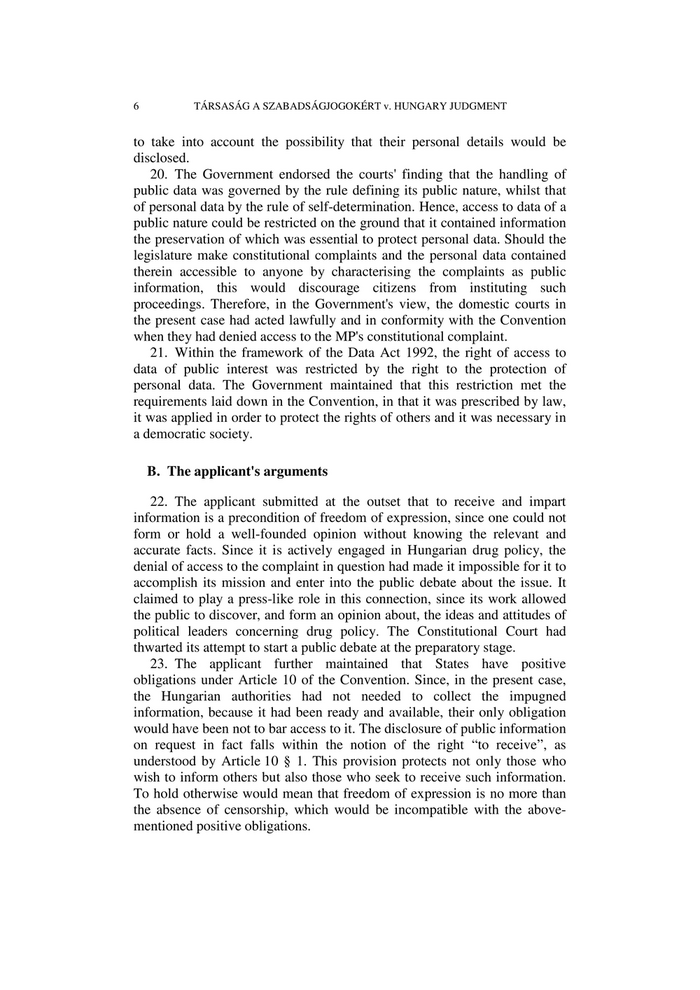
TÁRSASÁG A SZABADSÁGJOGOKÉRT v. HUNGARY JUDGMENT 7 24. The applicant also submitted that the private sphere of politicians was narrower than that of other citizens, since they exposed themselves to criticism. Therefore, access to their personal data might be necessary if it concerned their public performance, as in the present case. If one accepted the Government's arguments, all data would be considered personal and excluded from public scrutiny – which would render the notion of public information meaningless. In any event, no details of the protected private sphere of the MP would have been made public in connection with his complaint. 25. Moreover, the applicant disputed the existence of a legitimate aim. The Constitutional Court had never asked the MP whether he would permit the disclosure of his personal data contained in his constitutional complaint. Therefore it could not be said that the restriction had served the protection of his rights. The Constitutional Court's real aim had been to prevent a public debate on the question. For the applicant, the secrecy of such complaints was alarming, since it prevented the public from assessing the Constitutional Court's practice. However, even assuming the existence of a legitimate aim, the restriction had not been necessary in a democratic society. Wide access to public information is in line with recent development of human rights' protection, as well as with Resolution No. 1087 (1996) of the Council of Europe's Parliamentary Assembly. C. The Court's assessment 1. Whether there has been an interference 26. The Court has consistently recognised that the public has a right to receive information of general interest. Its case-law in this field has been developed in relation to press freedom which serves to impart information and ideas on such matters (see Observer and Guardian v. the United Kingdom, 26 November 1991, § 59, Series A no. 216, and Thorgeir Thorgeirson v. Iceland, 25 June 1992, § 63, Series A no. 239). In this connection, the most careful scrutiny on the part of the Court is called for when the measures taken by the national authority are capable of discouraging the participation of the press, one of society's “watchdogs”, in the public debate on matters of legitimate public concern (see Bladet Tromsø and Stensaas v. Norway [GC], no. 21980/93, § 64, ECHR 1999-III, and Jersild v. Denmark, 23 September 1994, § 35, Series A no. 298), even measures which merely make access to information more cumbersome. 27. In view of the interest protected by Article 10, the law cannot allow arbitrary restrictions which may become a form of indirect censorship should the authorities create obstacles to the gathering of information. For example, the latter activity is an essential preparatory step in journalism and is an inherent, protected part of press freedom (see Dammann v. Switzerland
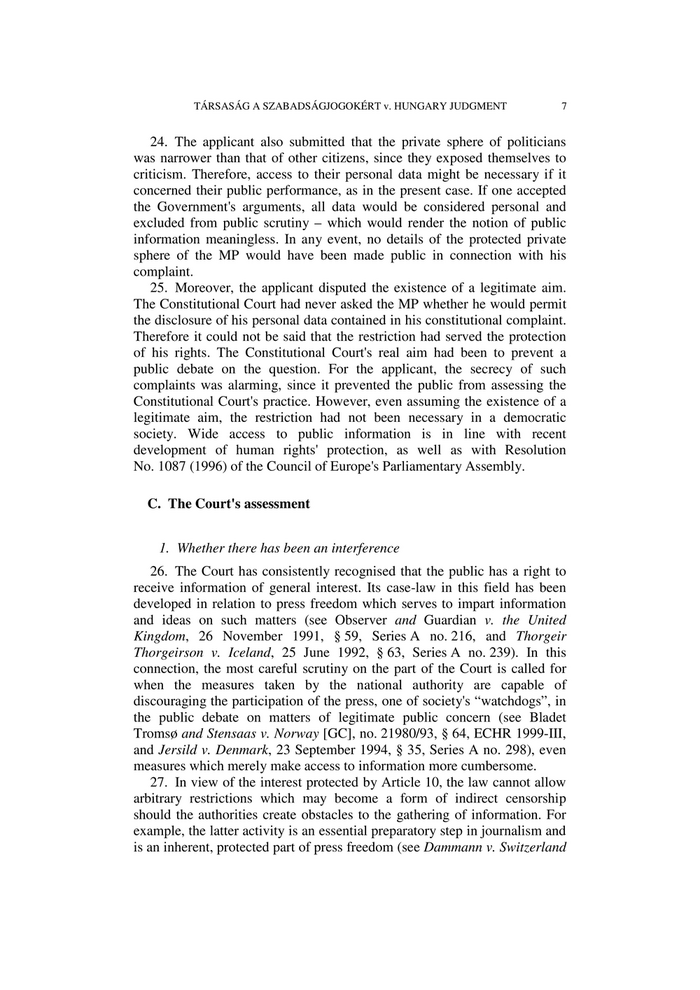
8 TÁRSASÁG A SZABADSÁGJOGOKÉRT v. HUNGARY JUDGMENT (no. 77551/01, § 52, 25 April 2006). The function of the press includes the creation of forums for public debate. However, the realisation of this function is not limited to the media or professional journalists. In the present case, the preparation of the forum of public debate was conducted by a non- governmental organisation. The purpose of the applicant's activities can therefore be said to have been an essential element of informed public debate. The Court has repeatedly recognised civil society's important contribution to the discussion of public affairs (see, for example, Steel and Morris v. the United Kingdom (no. 68416/01, § 89, ECHR 2005-II). The applicant is an association involved in human rights litigation with various objectives, including the protection of freedom of information. It may therefore be characterised, like the press, as a social “watchdog” (see Riolo v. Italy, no. 42211/07, § 63, 17 July 2008; Vides Aizsardzības Klubs v. Latvia, no. 57829/00, § 42, 27 May 2004). In these circumstances, the Court is satisfied that its activities warrant similar Convention protection to that afforded to the press. 28. The subject matter of the instant dispute was the constitutionality of criminal legislation concerning drug-related offences. In the Court's view, the submission of an application for an a posteriori abstract review of this legislation, especially by a Member of Parliament, undoubtedly constituted a matter of public interest. Consequently, the Court finds that the applicant was involved in the legitimate gathering of information on a matter of public importance. It observes that the authorities interfered in the preparatory stage of this process by creating an administrative obstacle. The Constitutional Court's monopoly of information thus amounted to a form of censorship. Furthermore, given that the applicant's intention was to impart to the public the information gathered from the constitutional complaint in question, and thereby to contribute to the public debate concerning legislation on drug-related offences, its right to impart information was clearly impaired. 29. There has therefore been an interference with the applicant's rights enshrined in Article 10 § 1 of the Convention. 2. Whether the interference was justified 30. The Court reiterates that an interference with an applicant's rights under Article 10 § 1 will infringe the Convention if it does not meet the requirements of paragraph 2 of Article 10. It should therefore be determined whether it was “prescribed by law”, whether it pursued one or more of the legitimate aims set out in that paragraph and whether it was “necessary in a democratic society” in order to achieve those aims. a. “Prescribed by law” 31. The applicant requested the information, relying on the Data Protection Act which guarantees access to data of public interest. The
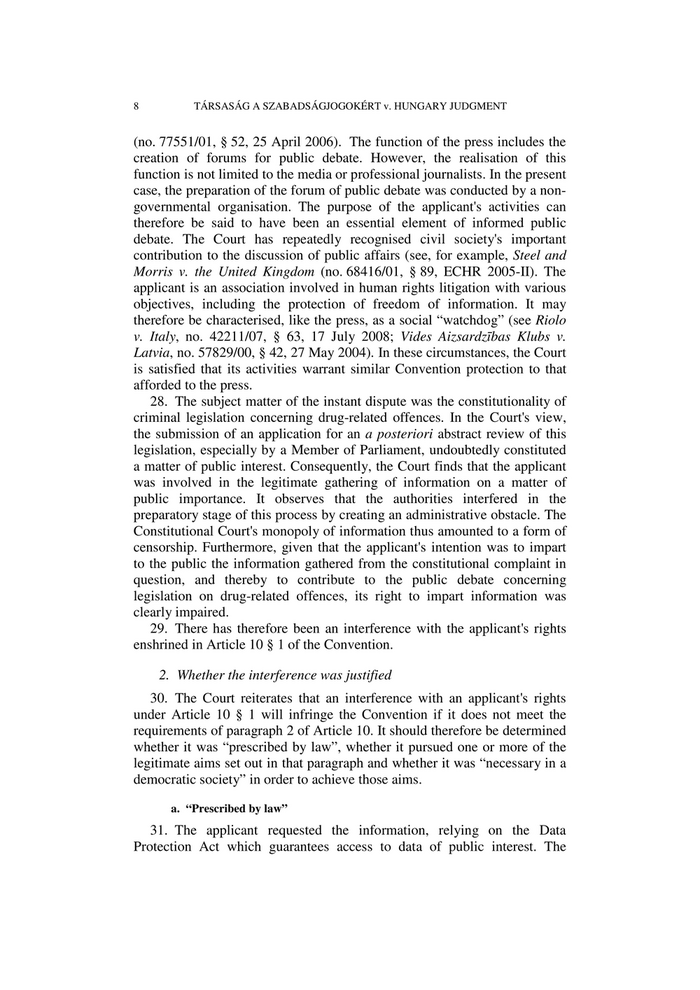
Das Projekt „Fragen und Antworten - Auskunftsrechte kennen und nutzen“ wird gefördert von:







